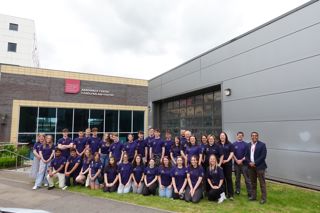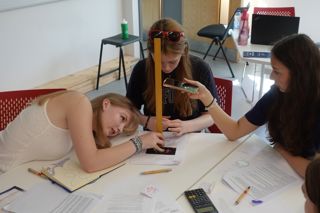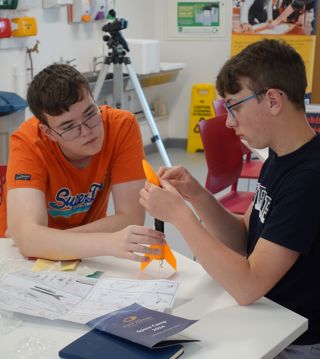
Space to Learn Camps launch in South Wales
- 4th Jul 2024
- Author: Em Truman
Last week we were welcomed by the University of South Wales to host the first of the Space to Learn camps. We were joined by brilliant staff and students from four schools across Wales, for a week of science education, engagement, and inspiration.
We kicked off the week with talks from Dark Skies Wales and Dr Leshan Uggalla, University of South Wales looking at observing space. These talks looked at techniques for observing planets and moons in our Solar System, the opportunities available in astronomy careers and the growing impact of space debris. The students also got hands-on using solar telescopes to observe aurora causing sunspots, learning how we use satellites to observe parts of Earth we can’t see with our eyes, and investigating comets, how they’re formed and how they may be the secret to life on Earth.

On Tuesday, we looked at sustainability in space, and how planets are formed. Prof Paul Roche from Cardiff University gave a fantastic talk on collisions in space, covering everything from the formation of the Solar System, to how crashing asteroids and comets could have kickstarted life on Earth. We then looked outside our Solar System to the planets orbiting other stars in our galaxy and investigated some of the techniques we use to discover their existence. Neil and Raphael from Welsh space company Space Forge got the students excited with their talk about the fascinating new technologies they’re pioneering. This discussion on how we can build key technological components and medicines in space got the students thinking about new uses of space. Darren Williams from the University of South Wales gave us some great insights on the instrumentation used in satellites. Having learnt about all the different ways we can observe objects in space, and use satellites to observe Earth, we decided to try our hand at building our own telescopes.

On Wednesday we battled through the heat for our rockets day. Dr Phil Charlesworth from the University of South Wales got us excited with his talk about the university’s amateur rocketry society, and some great examples of just how large home-made rockets can be. We then built small, motorised rockets with some students from the University of South Wales, we were unable to launch these rockets at the camp but the schools have been invited back for a launch day at a later date. Grant Day from the European Space Agency gave us a fascinating talk about the future plans for European space nations. Jill Hutchinson from Thales Alenia Space gave us an overview of the work their company is doing across the UK, and some of their future plans. It was all go in the afternoon with students completing a tour of the university campus and then heading across the site to build and launch their own compressed air rockets.
Flt Lt Greenwood from UK Space Command opened up Thursday’s activities by showing us how vital space is to everyday life, and the ways UK Space Command are helping to keep it safe. Students from the University of South Wales then led a session where we learnt how to build and programme small satellites, and how to control motorised satellites and their receivers on Earth. Dr Rosie Cane from Space Wales gave us a brilliant oversight of the space sector in Wales, showing us the links between universities and companies operating in the country. We wrapped Thursday up with a talk from Prof Zoran Jellick from Swansea University talking about rocket propulsion, and giving students a taste of what they might learn at university one day.
By Friday we had a much-needed break in the heatwave as we wrapped up the week by discussing human spaceflight. We had a fantastic talk by Prof Damian Bailey from the University of South Wales, where we learnt about his cutting-edge research into the brain health of astronauts, and how we can make spaceflight less harmful. We had some fantastic hands-on investigations into the effects of low pressure and the vacuum of space on the human body, and we even got to try on a real high-altitude flight suit that modern space suits are based on.
Throughout the week the students also worked on a project to design a space mission. Over the week they chose a target destination in our Solar System, and then came up with a question they wanted to answer on their mission. With their goal in mind the students planned their payload, designed their mission and even produced a radio advert for their mission. On Friday afternoon all the students presented their missions to their peers at the camp. The missions were all brilliantly presented and well thought out, with many students discussing topics above and beyond what they’ve learnt at school.
Overall, it was a thoroughly enjoyable week with a fantastic group of students. Everyone who attended the camp had a great time and was a credit to their school. We even had some students asking us when we’ll be running the next space camp in the area, so keep your eyes peeled.





